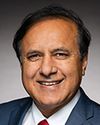First, it's a decision in the right direction, as I mentioned in my opening remarks. However, we recommend going even further. If a student comes to Canada, you will probably know that the student is authorized to have, or can have, the right to apply for a work permit one year or three years after their graduation.
If you go back several years, we have been advocating for Canada to have a visa of five years or 10 years—similar to the U.S., for example, with fewer security issues. It took 15 years for the government to make this decision. They used to give visas for one month, 15 days, multiple entry, one entry and things like that. It is now much better in terms of processing, and the security level is the same.
Here we're saying the same. When someone wants to come to study in Canada, the person is highly likely to work in Canada for one or three years after graduation. Why do we want to add a burden on the system and ask the individual to submit another work permit application? The individual or the student has already submitted an application. He became a student, and now he can continue working afterwards with the same permit, extended another three years.
The same has happened with the study permit. Before those days, if you recall—probably many of you were here 10 years ago—you used to submit for a study permit. After the student comes here to study, then he submits for a work permit if he wants to work off campus. Those need to be removed. It should be removed faster than it has been.





